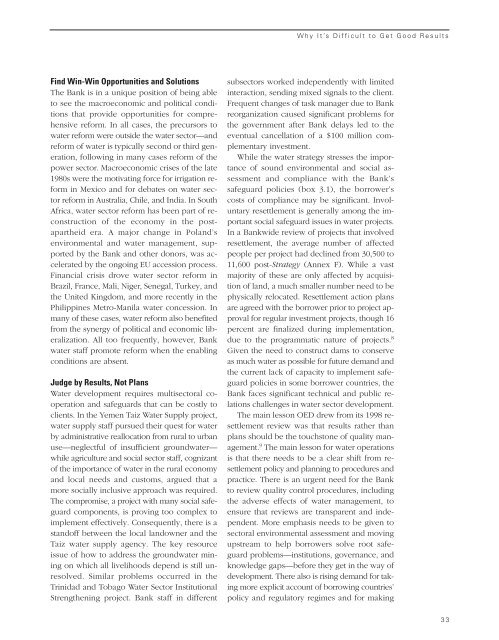Download Report - Independent Evaluation Group - World Bank
Download Report - Independent Evaluation Group - World Bank
Download Report - Independent Evaluation Group - World Bank
You also want an ePaper? Increase the reach of your titles
YUMPU automatically turns print PDFs into web optimized ePapers that Google loves.
Why It’s Difficult to Get Good ResultsFind Win-Win Opportunities and SolutionsThe <strong>Bank</strong> is in a unique position of being ableto see the macroeconomic and political conditionsthat provide opportunities for comprehensivereform. In all cases, the precursors towater reform were outside the water sector—andreform of water is typically second or third generation,following in many cases reform of thepower sector. Macroeconomic crises of the late1980s were the motivating force for irrigation reformin Mexico and for debates on water sectorreform in Australia, Chile, and India. In SouthAfrica, water sector reform has been part of reconstructionof the economy in the postapartheidera. A major change in Poland’senvironmental and water management, supportedby the <strong>Bank</strong> and other donors, was acceleratedby the ongoing EU accession process.Financial crisis drove water sector reform inBrazil, France, Mali, Niger, Senegal, Turkey, andthe United Kingdom, and more recently in thePhilippines Metro-Manila water concession. Inmany of these cases, water reform also benefitedfrom the synergy of political and economic liberalization.All too frequently, however, <strong>Bank</strong>water staff promote reform when the enablingconditions are absent.Judge by Results, Not PlansWater development requires multisectoral cooperationand safeguards that can be costly toclients. In the Yemen Taiz Water Supply project,water supply staff pursued their quest for waterby administrative reallocation from rural to urbanuse—neglectful of insufficient groundwater—while agriculture and social sector staff, cognizantof the importance of water in the rural economyand local needs and customs, argued that amore socially inclusive approach was required.The compromise, a project with many social safeguardcomponents, is proving too complex toimplement effectively. Consequently, there is astandoff between the local landowner and theTaiz water supply agency. The key resourceissue of how to address the groundwater miningon which all livelihoods depend is still unresolved.Similar problems occurred in theTrinidad and Tobago Water Sector InstitutionalStrengthening project. <strong>Bank</strong> staff in differentsubsectors worked independently with limitedinteraction, sending mixed signals to the client.Frequent changes of task manager due to <strong>Bank</strong>reorganization caused significant problems forthe government after <strong>Bank</strong> delays led to theeventual cancellation of a $100 million complementaryinvestment.While the water strategy stresses the importanceof sound environmental and social assessmentand compliance with the <strong>Bank</strong>’ssafeguard policies (box 3.1), the borrower’scosts of compliance may be significant. Involuntaryresettlement is generally among the importantsocial safeguard issues in water projects.In a <strong>Bank</strong>wide review of projects that involvedresettlement, the average number of affectedpeople per project had declined from 30,500 to11,600 post-Strategy (Annex F). While a vastmajority of these are only affected by acquisitionof land, a much smaller number need to bephysically relocated. Resettlement action plansare agreed with the borrower prior to project approvalfor regular investment projects, though 16percent are finalized during implementation,due to the programmatic nature of projects. 8Given the need to construct dams to conserveas much water as possible for future demand andthe current lack of capacity to implement safeguardpolicies in some borrower countries, the<strong>Bank</strong> faces significant technical and public relationschallenges in water sector development.The main lesson OED drew from its 1998 resettlementreview was that results rather thanplans should be the touchstone of quality management.9 The main lesson for water operationsis that there needs to be a clear shift from resettlementpolicy and planning to procedures andpractice. There is an urgent need for the <strong>Bank</strong>to review quality control procedures, includingthe adverse effects of water management, toensure that reviews are transparent and independent.More emphasis needs to be given tosectoral environmental assessment and movingupstream to help borrowers solve root safeguardproblems—institutions, governance, andknowledge gaps—before they get in the way ofdevelopment. There also is rising demand for takingmore explicit account of borrowing countries’policy and regulatory regimes and for making33
















